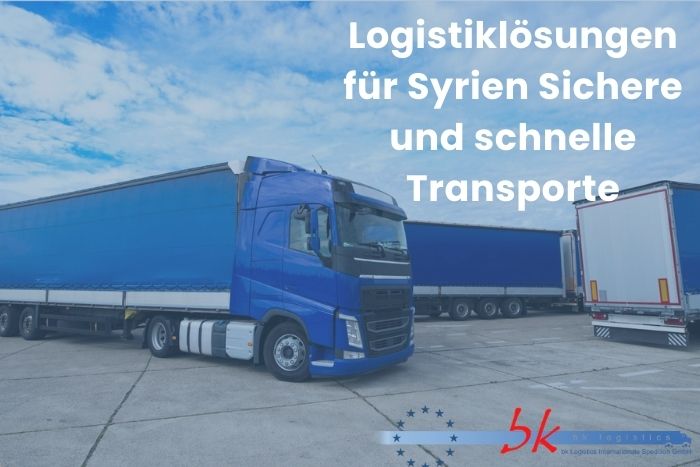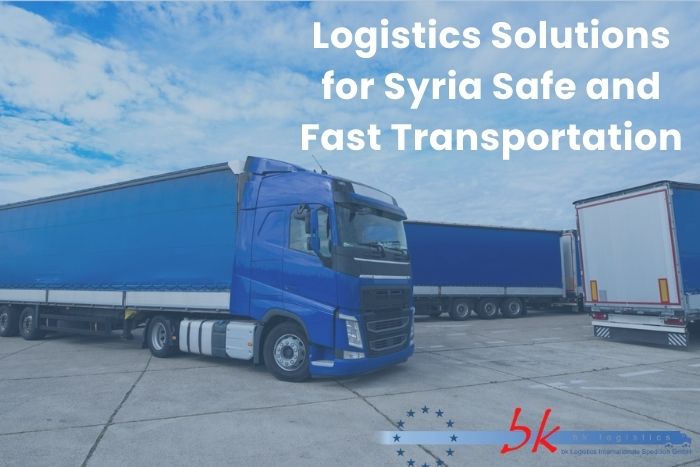News
Logistics Solutions to Syria Safe and Fast Transportation
Syria, a country that has faced significant political and economic challenges in recent years, has reached a turning point in the logistics and transportation sector. In this context, providing safe and fast transportation solutions is of critical importance, especially for international companies and humanitarian organizations. The effectiveness of logistics services to Syria plays a major role in ensuring the timely and secure delivery of humanitarian aid while also helping to revitalize trade.
Although much of Syria’s logistics infrastructure has been severely damaged due to the war, the region still has strategically important highways and ports. Therefore, it is essential to leverage the potential of these infrastructures to develop effective transportation solutions. Logistics solutions contribute not only to reorganizing trade but also play a critical role in delivering humanitarian aid to the region.
Safety and Risk Management in Transportation
One of the most important factors in providing logistics services to Syria is safety. The ongoing civil war and conflicts in the country create significant risks in the transportation process, increasing costs and transit times. To ensure safe transportation, companies must take various measures to minimize risks in both maritime and road transport. Establishing safe corridors, protecting vehicles with armed security forces, and utilizing the latest technologies are key factors in ensuring transportation safety.
In this process, risk management also plays a significant role. Logistics companies should identify potential hazards on transportation routes in advance and develop alternative routes. Additionally, it is necessary to avoid areas classified as danger zones and redirect transportation to safer regions. These methods will minimize potential disruptions and damages related to transportation.
Fast Transportation Solutions and the Role of Technology
In today’s logistics industry, speed is one of the most critical factors directly affecting success. When providing transportation services to Syria, transit times must be reduced to a minimum. This is especially vital for restarting trade and delivering humanitarian aid to those in need as quickly as possible. At this point, the importance of technology and digitalization processes is immense.
Using real-time tracking systems for vehicles and cargo during transportation makes the process more efficient. GPS-based tracking systems ensure that transportation services are completed on time, providing both cargo owners and transportation companies with accurate information. Additionally, booking and planning operations conducted through digital platforms contribute to faster and more efficient processes.
Logistics Solutions for Humanitarian Aid
The humanitarian crisis in Syria carries an increasing urgency with each passing day. Aid organizations require effective logistics solutions to deliver essential supplies to refugees and war victims. The fast and secure delivery of food, water, medicine, and other basic materials is vital in addressing this crisis.
During the transportation of humanitarian aid, proper packaging and handling of materials are necessary. Furthermore, logistics infrastructure must function smoothly to direct aid to accessible and safe locations. In this process, local authorities and international aid organizations should collaborate with logistics service providers to ensure that aid reaches the right regions as quickly as possible.
International Transportation and Access to Syria
When providing international transportation services to Syria, international trade norms and customs procedures are of great importance. Companies wishing to ship to Syria may encounter customs barriers. These obstacles can prolong the transportation process and lead to additional costs. Therefore, international transportation companies must be familiar with local laws and regulations and obtain all necessary permits in advance to complete the transportation process as quickly as possible.

Another critical aspect of international transportation is the selection of transportation routes. When transporting to Syria, appropriate routes must be determined to ensure the safe delivery of goods. Here, the integration of road and maritime transport accelerates logistics processes and reduces costs, making them more efficient.
Integrated Systems and Efficiency in Logistics Solutions
In today’s world, the logistics sector is not just about transportation and distribution processes. An effective logistics solution involves not only transportation but also the efficient management of storage, inventory, and distribution channels. Therefore, the use of integrated logistics systems ensures that transportation processes become more efficient. When providing logistics services in challenging conditions like Syria, using integrated systems is crucial for delivering services on time and accurately.
Integrated logistics systems digitize and automate all transportation processes. These systems enable operations such as load tracking, route optimization, vehicle management, and stock control to be managed on a single platform. Especially in risky regions like Syria, such systems offer significant advantages both operationally and in terms of cost, ensuring proper coordination of logistics services. Moreover, these systems help identify potential disruptions in the transportation process in advance and provide rapid solutions.
When providing logistics services to Syria, not only land transportation but also sea transportation and air transportation play a significant role. Syria’s ports and airports are of great importance for the smooth operation of transportation. In particular, sea transportation is a preferred method for carrying larger and heavier loads. Additionally, sea transportation can be conducted at lower costs compared to land transportation. However, external factors such as weather conditions and port accessibility must also be considered in sea transportation.
Another important aspect is the acceleration of processes. Fast transportation is generally made possible through advanced storage techniques and routing strategies. At this point, all processes related to transportation need to be optimized. For example, minimizing the loading and unloading times of transport vehicles contributes to reducing transportation costs and shortening transit times. Proper packaging and routing of loads also help ensure that transportation processes occur more quickly and smoothly.
Environmental Sustainability in Logistics Solutions
In today’s logistics sector, environmental sustainability is gaining increasing importance. Logistics companies must adopt environmentally friendly approaches in transportation processes, providing not only economic but also environmental benefits. In a region like Syria, environmental factors should also be considered in logistics processes. This contributes to making transportation processes more efficient and eco-friendly. Environmental sustainability includes elements such as energy efficiency, reducing carbon emissions, and utilizing renewable energy sources.
To make logistics services in Syria environmentally friendly, the use of electric transportation vehicles can be encouraged. Additionally, the fuel types used in transportation should be selected to cause less harm to the environment and produce lower carbon emissions. At this point, next-generation technologies and green logistics solutions can make transportation processes in Syria more sustainable. Recycling and waste management are also key components of these sustainable logistics solutions, helping to prevent environmental pollution during transportation.
Contributions of Logistics to the Local Economy
It should not be forgotten that the logistics sector not only helps reorganize trade but also provides significant contributions to the local economy. The effective implementation of logistics processes in Syria supports the local workforce and creates new job opportunities. In particular, it creates a large market for local transportation companies, storage firms, and logistics infrastructure providers. This contributes to the revitalization of the local economy and accelerates economic growth.
To contribute to the local economy, logistics companies can employ local labor and collaborate with local firms, thereby supporting economic development in the region. Additionally, using local supply chains in logistics processes allows for more local added value to be generated in Syria’s economy. This helps establish a strong business network with local producers and suppliers within the country, reducing external dependencies.
Challenges and Solutions in Syria’s Logistics Sector
The logistics sector in Syria must contend with obstacles caused by war and internal conflicts. These challenges can negatively affect both the safety and speed of transportation. Much of Syria’s logistics infrastructure has been damaged, leading to disruptions in transportation processes. Roads, ports, and airports—key infrastructure components—have largely been destroyed or rendered unusable, causing significant setbacks in all types of transportation processes.
Nevertheless, a series of solution proposals have been developed to address these challenges. First and foremost, the repair and modernization of Syria’s logistics infrastructure are necessary. Road construction projects, strengthening port infrastructure, and rebuilding airports will accelerate transportation processes and enhance the efficiency of logistics services. Additionally, strengthening cooperation between local and international logistics companies can improve the safety of transportation processes.
The Future of Logistics Solutions: Digitalization and Automation
In the future, digitalization and automation will become even more significant in the logistics sector. To enhance logistics processes in Syria, digitalization efforts need to be accelerated. Technologies such as artificial intelligence, machine learning, and the Internet of Things (IoT) can make logistics services more efficient. Data analytics can be used to optimize transportation routes and shorten transit times.
Additionally, robotic systems and autonomous vehicles will increase workforce efficiency and reduce costs in the logistics sector. These technologies automate transportation processes, minimizing human errors and accelerating the process. Such digital solutions contribute to making logistics services in Syria more secure and faster. Moreover, using digital tracking systems during transportation ensures that loads are delivered safely and on time.
In conclusion, providing logistics solutions in Syria is not just about improving transportation processes but also involves considering environmental, economic, and digitalization factors. These multifaceted developments in the logistics sector will revitalize both Syria’s internal and external trade, delivering significant benefits to the region’s people and businesses.



